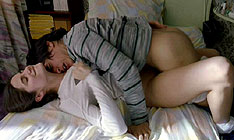|
|
|
|
Y Tu Mamá
Tambíen
|
 |
|
Y Tu Mamá Tambíen is a movie for which I, like many filmgoers, waited eagerly. It represents the possibility of global success for a film that is neither a blockbuster nor a product of the Hollywood system. In fact, it hails from Mexico, a country which rarely figures in the maps of world cinema culture today. Alfonso Cuarón is a director I admire. Of his work in America, A Little Princess (1995) is a touching and underrated film for children, while the much-derided Great Expectations (1998) possesses a terrific energy. Any filmmaker who can span, in little over a decade, an earthy comedy about AIDS (Solo Con Tu Pareja, 1992) and the third instalment of the Harry Potter series has my rapt attention. Cuarón returns to Mexico for this independent production, reviving a script he first wrote in the '80s. Contrary to the lushness of his American work, this has all the hallmarks of gritty Mexican realism in its sometimes confronting physicality and on-the-road location filming. In its neatest twist, the film offsets the usual orientation of such realism by focusing firmly on the milieu of middle class professionals. Tenoch (Diego Luna) and Julio (Gael Garcia Bernal) are two unformed, dope-smoking, horny teens who long for a little adventure once their no-less itchy girlfriends have flown to Italy for a holiday. At an extravagant wedding, they try to chat up Luisa (Maribel Verdu), an older, married woman. When Luisa hits a rocky patch with her husband, she impulsively decides to accept the boys' only half-serious offer to drive to a paradisal beach far away. The scene is now set for a reasonably raunchy triangular relationship on the road. The guys boast about their anarchic, self-penned manifesto and fall into squabbling over their girlfriends. Luisa quickly shakes loose her shell of vulnerability. And we wonder what really lies underneath the male facade of loud homophobia. Y Tu Mamá Tambíen begins well and showcases three wonderful, authentic performances. Its well-timed vulgarity is immensely appealing. But the film finally does not, for me, add up to very much. It quickly became, around the world, a somewhat overrated achievement. Cuarón delivers, in a rather calculated way, on every possible daydream of his diverse target audiences. The film is simultaneously a male teen-dream and a bittersweet-adult woman's story. It extols the joys of free love, but also acknowledges with caustic humour that young guys have poor sexual technique. It thrills with the promise that it will breach taboos, but never actually confronts us with the full-on spectacle of this. Least successful, to my mind, is the way in which Cuarón tries both to tell a story of self-involved individuals, while also hinting at a larger, political picture all around them. The social aspects of the film, however, are tokenistic. What we learn in flashes via the omniscient narrator or in sidelong glimpses along the road have no real bearing on the internal story of desire and identity. Cuarón, here, is trying to have it every which way, and this is the film's most obviously strained gesture towards artistic significance. MORE Cuarón: Fallen Angels © Adrian Martin August 2002 |
![]()